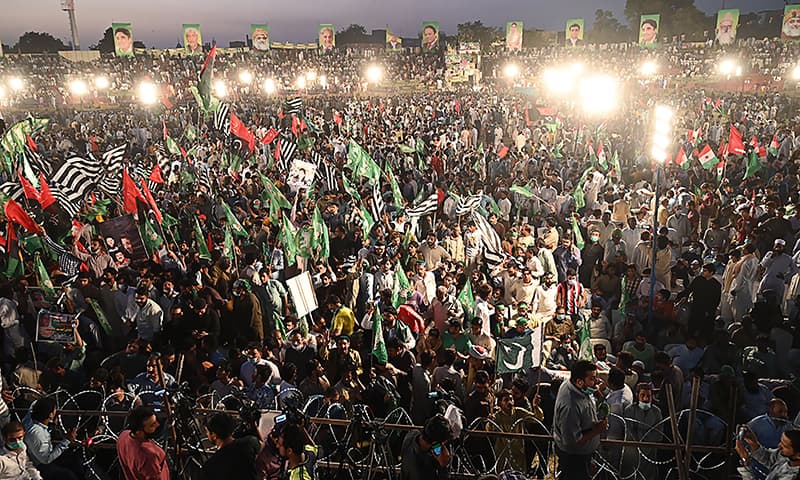
Will the rise of the Pakistan Democratic Movement (PDM) result in the return to true democracy inside Pakistan and what impact will this have if any on the Military Intelligence establishment?
In his latest editorial in The Friday Times, titled “The Pakistan Democratic Movement has kicked off with a bang. What next?” veteran journalist and editor Najam Sethi argues “This moment of crisis for the Miltablishment is a moment of reckoning for Pakistan.”
According to Sethi: “The Gujranwala Jalsa on 16th October went according to script – nearly 50,000 people inside and outside the stadium despite all the road blocks, arrests and police scuffles – until Nawaz Sharif came to the crease and hit every ball out of the park, launching an unprecedented anti-Miltablishment narrative targeting its two leading lights. This narrative is now echoing in the four corners of the country. Days later in Karachi, as if on cue, the leaders of regional sub-nationalist parties – Mohsin Dawar, Akhtar Mengal, Abdul Malik, Mahmood Khan Achakzai, Ameer Haider Hoti – with historical grievances against Islamabad, stood up to thunder against the Miltablishment, making the three original sinners, Bilawal Bhutto, Maryam Nawaz and Maulana Fazal ur Rahman, look tame in comparison. This is an extraordinary situation for several reasons. Within the PMLN, it signals a back seat for the “rapprochement-with-Miltablishment” narrative of Shahbaz Sharif who is silently languishing in jail and a front seat for the “anti-state-above-state” narrative of Nawaz Sharif who is blasting away from exile in London. Among the mainstream big PDM alliance partners – right-wing religious JUI, leftist secular PPP and centrist conservative PMLN – it suggests a narrowing down of their ideological positions against the anti-democracy role of the Miltablishment in politics. Indeed, the PMLN and JUI were once solidly pro-Miltablishment parties. The PDM can also claim to represent nearly 65% of the votes cast in the last elections across the length and breadth of Pakistan, even if no account is taken of the rigging in about 70 national seats that eventually gave 31% of the votes to the PTI. In other words, the anti-Miltablishment narrative of grievances has come in from the cold periphery of Pakistan into its warm heartlands, most prominently in the Punjab and Khyber-Pakhtunkhwa whence the Miltablishment draws nearly 70% of its rank and file. The Karachi jalsa has also served notice on the Miltablishment in another dramatic manner.”
Sethi points out “When Miltablishment officers dragged the Sindh IGP and Additional
IGP out of their homes in the dead of night after the Jalsa, took them to the headquarters of the Sector Commander and leaned on them to order the arrest of Captain (retd) Mohammad Safdar for sloganeering inside the Quaid-e-Azam’s Mausoleum, it triggered an unprecedented and stunning revolt by the Sindh police and compelled no less than the COAS to order an inquiry into the sordid affair. Turns out that the gent who filed the FIR is a PTI-ite, a registered “proclaimed offender” who wasn’t even present at the scene of the alleged crime. Significantly, this episode has served to fuel the PDM’s anti-Miltablishment narrative sweeping across the country and could conceivably be the precursor of similar revolts or strikes or protests in other organs of the state, particularly in the civil bureaucracy and judiciary, that are labouring under similar “pressures”. It has been pointed out by political analysts, for example, that five chief secretaries and five IGPs in the Punjab have been summarily or arbitrarily shunted in the last two years despite a Supreme Court landmark judgment in the Anita Turab case frowning upon cavalier postings and transfers without due process or reason. The recent humiliation of the IGP by a rash new CCOP in the Punjab readily comes to mind, as does the ouster of a judge of the Islamabad High Court and the proceedings for ouster of a Supreme Court judge who have earned the ire of the Miltablishment on account of their judgments. Not so long ago, we were witness to the unaccountable police actions of an SP, a pro-Miltablishment officer who ran afoul of his superiors in the Sindh government.”
Finally, “The consequences of this focus on the Miltablishment can be good or bad for the power-players, depending on how it and the PTI government react singly or jointly. Until now, the PTI government has been blithely shrugging away its abysmal misgovernance and corruption by relying on the unqualified support of the Miltablishment. Unfortunately, the Miltablishment hasn’t helped its own cause by publicly subscribing to the “same-page” policy prescriptions. Overnight, however, the Miltablishment rather than the PTI government is in the eye of the gathering storm. If it continues to play political partisanship, it will have to sanction renewed repression against the opposition. But this will further discredit it and make it lose the respect of Pakistanis which is the glue that binds state and society. If it doesn’t, it will have to seek accommodation with the PDM which means nothing less than cutting the root cause of its troubles, Imran Khan, adrift.”
![]()





